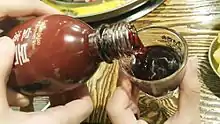Bokbunja-ju
Bokbunjaju (복분자주; 覆盆子酒), also called bokbunja wine, is a Korean fruit wine made from wild and/or cultivated black raspberry; traditionally of the Korean species Bokbunja (Rubus coreanus), but nowadays mostly from Rubus occidentalis, which originates from Northern America and is now widely cultivated in Korea.
 | |
| Type | Fruit wine |
|---|---|
| Country of origin | Korea |
| Ingredients | black raspberries |
| Korean name | |
| Hangul | 복분자주 |
|---|---|
| Hanja | 覆盆子酒 |
| Revised Romanization | bokbunjaju |
| McCune–Reischauer | pokpunjaju |
| IPA | [pok̚.p͈un.dʑa.dʑu] |
The beverage is produced in Gochang County, Jeollabuk-do, in Damyang, Jeollanam-do,[1] and in Jeju Island, South Korea.[2] It is made by fermenting berries with water.[3][4] Some varieties also contain rice and reishi mushroom extract.[5]
The wine is deep red in color and moderately sweet. The scent of ripe fruit rises, and the sour taste is low. The bitter taste left behind makes it go well with food. Soft tannins irritate the tongue.[6] It ranges between 15% and 19% alcohol by volume, depending on the brand.[7] It is believed to be healthful [8] and to promote male sexual stamina.[9]
Since 2008, South Korean scientists have searched for ways to use bokbunja seeds, which are a by-product of bokbunja ju production. The carbonized seeds can be used as potential adsorbent for industrial dye removal from wastewaters.[10]
References
- "Daenamugol Bokbunja-ju 16%". Chusungkoul.en.ecplaza.net. Archived from the original on 2015-01-28. Retrieved 16 February 2015.
- Seoul. Lonely Planet. 2003. p. 122. ISBN 9781740592185. Retrieved 24 January 2015 – via Internet Archive.
bokbunja.
- "Official Site of Korea Tourism Org.: Korean Traditional Liquor". English.visitkorea.or.kr. Archived from the original on 16 February 2020. Retrieved 16 February 2015.
- "All sizes — BokBunJa: Korean black raspberry wine — Flickr — Photo Sharing!". Flickr.com. Retrieved 16 February 2015.
- "Jindo Bokbunja Hongju". Eckorea.ecplaza.net. Archived from the original on 2015-01-28. Retrieved 16 February 2015.
- "복분자주". terms.naver.com (in Korean). Retrieved 2021-04-11.
- ":: AgraFood ::". Archived from the original on 2011-07-16. Retrieved 2009-03-28.
- "Official Site of Korea Tourism Org.: Korean Traditional Liquor". English.visitkorea.or.kr. Archived from the original on 16 February 2020. Retrieved 24 January 2015.
- Jeon, Jeong Hee; Shin, Sunhee; Park, Dongsun; Jang, Ja Young; Choi, Byong-il; Kang, Jong-Koo; Joo, Seong Soo; Hwang, Seock-Yeon; Kim, Jong-Choon; Kim, Byung-Yul; Kim, Mee Ree; Kim, Yun-Bae (2008). "Fermentation Filtrates of Rubus coreanus Relax the Corpus Cavernosum and Increase Sperm Count and Motility". Journal of Medicinal Food. Liebertonline.com. 11 (3): 474–478. doi:10.1089/jmf.2007.0070. PMID 18800894. Retrieved 24 January 2015.
- Bokbunja Wine Industry Waste as Precursor Material for Carbonization and Its Utilization for the Removal of Procion Red MX-5B from Aqueous Solutions. Arthur Raj Binupriya, Muthuswany Sathishkumar, Sung Hun Jung, Sun Hwa Song and Soon-Il Yun, CLEAN – Soil, Air, Water, November 2008, Volume 36, Issue 10-11, pages 879–886, doi:10.1002/clen.200700202